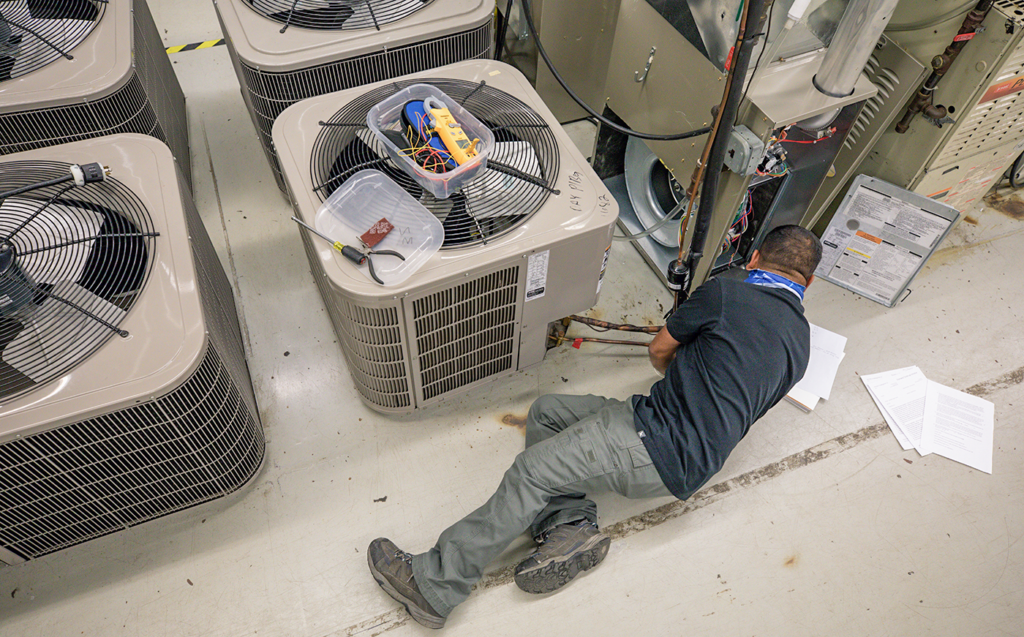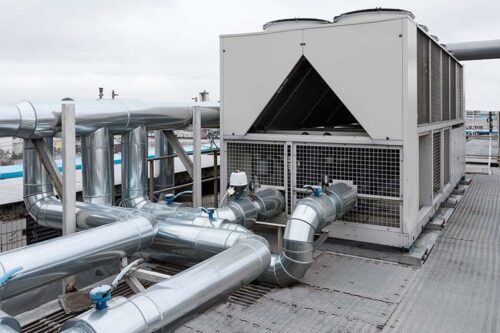Affordable Furnace Installation Services For Every Budget And Expectation
Affordable Furnace Installation Services For Every Budget And Expectation
Blog Article
Your Guide to Choosing the Right HVAC System for Your Demands
Choosing a suitable a/c system is an essential decision that can considerably affect convenience and power efficiency in your home. Various elements must be considered, consisting of the dimension of your house, neighborhood climate conditions, and particular heating or cooling down requirements. Furthermore, understanding the various sorts of systems readily available and their power rankings can assist direct your option. By assessing these elements thoroughly, you can prevent typical mistakes. What key considerations should you prioritize to ensure your financial investment satisfies both lasting and prompt demands?
Recognizing A/c System Types
When choosing a cooling and heating system, it is vital to recognize the different kinds offered to fulfill your particular needs. The key groups of a/c systems consist of central air conditioning systems, ductless mini-split systems, warmth pumps, and heating system systems.
Central air conditioning systems are made to cool multiple areas making use of ductwork to disperse conditioned air. They are ideal for larger homes calling for consistent temperature level control. Ductless mini-split systems, on the other hand, offer versatility and performance, as they permit zoning capabilities, making it possible for individual space temperature level law without the requirement for ductwork.
Warmth pumps operate by moving warmth as opposed to generating it, making them an energy-efficient choice for both heating & cooling. They are especially efficient in moderate environments. Conversely, heating system systems make use of combustion to create warmth, utilizing either oil, electrical energy, or gas. They are favored in chillier regions where heating needs are considerable.
Each system has distinct benefits and considerations, consisting of installment needs, upkeep, and general costs. Comprehending these types will aid property owners make educated decisions based on their particular needs, environment, and spending plan restraints, ultimately making certain optimal convenience and performance.
Examining Energy Efficiency
Energy effectiveness is an essential aspect in the selection of a HVAC system, as it straight influences both utility expenses and environmental sustainability. The Seasonal Power Efficiency Proportion (SEER) and the Heating Seasonal Efficiency Variable (HSPF) are vital indications for air conditioning systems, representing their effectiveness over a typical cooling and heating season, respectively.
Furthermore, search for systems that have made the power STAR tag. This accreditation represents that the devices meets strict energy effectiveness standards established by the U.S. Epa. Think about the system's variable-speed innovation, which permits more reliable procedure by adjusting the output to match demand, better boosting power cost savings.
Additionally, proper insulation and duct sealing can substantially affect the system's general effectiveness. In recap, picking an energy-efficient cooling and heating system not just reduces your energy bills however also adds to a more sustainable atmosphere, making it a vital factor to consider in your acquiring procedure.
Assessing System Dimension
Choosing the appropriate size for a heating and cooling system is crucial to making sure ideal efficiency and efficiency. An undersized system might battle to maintain desired temperatures, resulting in increased deterioration, greater energy consumption, and diminished convenience. Alternatively, a large system can lead to quick biking, which not just causes inadequacies however additionally influences moisture control Recommended Site and air top quality.
To evaluate the ideal sizing, it is important to perform a load calculation, which considers elements such as the square footage of the helpful hints area, insulation levels, home window sizes, and neighborhood climate conditions - furnace repair. This computation aids identify the British Thermal Systems (BTU) needed for home heating and cooling. Additionally, it is essential to represent certain demands, such as the variety of owners and the existence of heat-generating appliances

Setup Prices and Budget
A comprehensive understanding of installation expenses is important for businesses and house owners thinking about a brand-new cooling and heating system. The overall expenditure of installation can differ widely based on several elements, consisting of the sort of system, the complexity of installment, and the location of the building. Generally, installation expenses can range from $3,000 to $10,000, relying on the system's size and efficiency.
When budgeting for a heating and cooling system, it is important to think about not only the initial installation expenses yet additionally any type of extra expenditures that might develop, such as ductwork alterations, electric upgrades, or authorizations. In addition, it is recommended to acquire numerous quotes from licensed heating and cooling contractors to make certain competitive pricing.
Homeowners need why not try these out to likewise consider the possible long-term financial savings connected with energy-efficient systems. While the upfront expenses may be greater, energy-efficient models can bring about substantial savings on energy expenses over time.

Upkeep and Longevity Considerations

Proper maintenance includes routine assessments, filter substitutes, and cleaning of air ducts and coils (boilder repair). Overlooking these jobs can lead to decreased efficiency, enhanced energy expenses, and early system failure. Home owners ought to likewise consider the schedule of solution agreements, which commonly provide scheduled upkeep and concern service, making sure that the system continues to be in peak condition
Long life differs by system type; for example, well-maintained air conditioning systems can last 15 to 20 years, while heatpump might have a lifespan of 10 to 15 years. Picking a system with a strong track record for integrity, along with purchasing regular upkeep, can significantly enhance the system's sturdiness. Additionally, going with higher-efficiency versions might bring about long-lasting savings on power expenses, balancing the first investment over time.
Verdict
In final thought, picking an appropriate a/c system requires mindful factor to consider of different aspects, including system kinds, energy efficiency, and dimension. Reviewing installment expenses and long-lasting maintenance demands is crucial for making certain optimum performance and cost-effectiveness. Involving with cooling and heating specialists can supply beneficial understandings and customized suggestions that line up with certain heating and cooling requirements. Inevitably, an educated decision will certainly improve comfort and performance in property settings while making the most of power savings.
Choosing a proper Heating and cooling system is an important decision that can dramatically influence comfort and energy efficiency in your home.Energy efficiency is a critical aspect in the choice of an A/c system, as it straight affects both energy expenses and ecological sustainability. The Seasonal Power Efficiency Ratio (SEER) and the Heating Seasonal Performance Variable (HSPF) are vital indicators for air conditioning systems, representing their performance over a normal air conditioning and heating period, respectively. Picking a system with a strong online reputation for integrity, along with investing in normal upkeep, can substantially improve the system's toughness.In verdict, choosing a proper HVAC system demands mindful consideration of numerous elements, consisting of system kinds, power performance, and dimension.
Report this page